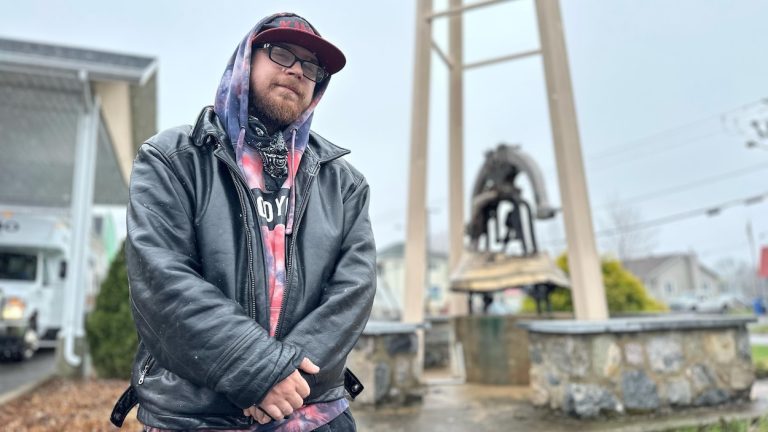
One analyst believes the government’s timeline “is really risky.”

Pierre Pharand, co-owner of the Outaouais Shooting Club, holds a banned weapon that he must store in his armory.
Ottawa now plans to wait until the 2025 election year to proceed with the mandatory buyback of military-style firearms, after the implementation of the program was slowed down by the refusal of Canada Post to participate, Radio- Canada.
A few months before the deadline, however, the details of the vast operation have yet to be defined, say several federal sources.
It is increasingly likely that the program will operate differently from one province to another due to difficulties finding partners to collect and transport AR-15s and other weapons banned since 2020.
There is no one rushing to participate in the program
says a source familiar with the latest internal discussions within the government.
The Liberals nevertheless plan to launch the program next year, even though their minority government will be subject to confidence votes on the budget in the spring and the election must be called no later than September. Additionally, the Conservative Party, under the leadership of Pierre Poilievre, opposes the buyback program.
One expert says the government has left itself little room to maneuver, especially given the possibility of misfires, rising costs or serious tensions with gun owners.
We are exposing ourselves to problems which will slow down the implementation of the buyback program. This is really risky on the part of the liberals.
In total, the government wants to recover at least 140,000 firearms in the country. The program has support from the gun control movement, but faces opposition from many hunting and shooter groups.
The government of Alberta, where there are approximately 50,000 banned firearms, actively opposes the mandatory buyback of legally purchased goods.

An Alberta flag and a pro-gun flag fly outside a rural home near Crossfield, Alta.
Photo: The U.S. Press / Jeff McIntosh
It’s already been four years since Ottawa promised to launch this program, after banning the sale and use of 1,500 models of weapons on 1er May 2020.
It looks like a liberal promise where we promise a lot, but we promise too much
says political science professor at the University of Alberta, Frédéric Boily.
The refusal of Canada Post
The government had to go back to square one after learning that Canada Post was refusing to collect weapons from its post offices, fearing for the safety of its employees.
Canada Post does not want to comment on the matter, but sources within the Crown corporation explain that many post offices are no more protected than an ordinary house, with no alarm system or surveillance cameras.

The Saint-Faustin post office in Mont-Blanc in the Laurentians.
Photo: Radio-United States / Philippe-Antoine Saulnier
Zero
says a Canada Post employee about security measures at his post office in a small municipality. The government is crazy if it thinks we can do this safely.
Ottawa would have liked owners of banned firearms to receive large boxes to place their unloaded weapons in, which they would then take to a Canada Post office to be transported and destroyed.
With weak security, however, many fear that post offices will be targets for thieves attracted by the presence of powerful weapons that have a high value on the black market.
Canada Post also fears that its employees will have negative interactions with owners who do not want to give up their weapons.
The Postal Workers Union says that the health and safety of our members comes first
.
How to collect weapons?
According to several government sources, Ottawa is still developing
options to recover more than 140,000 banned weapons located across the country.

Several types of firearms, such as the AR-15 rifle, very popular in North America, have been banned since 2020 in Canada.
Photo: The U.S. Press / AP / Alex Brandon
A source says Ottawa is exploring avenues to variable geometry
depending on the willingness of government and police institutions from different provinces to participate in the project.
Among the options under study, the government plans to create drop points
where owners could return their weapons.
In New Zealand, where a semi-automatic weapons buyback program was implemented in 2019, police organized hundreds of temporary collection points across the country where citizens could turn in their banned rifles.

Semi-automatic weapons handed over to New Zealand police have been systematically destroyed.
Photo: Getty Images / Hagen Hopkins
Despite opposition from police groups and police chiefs in Canada, the government is also evaluating the possibility of working with law enforcement to collect weapons. The Sûreté du Québec and the Ontario Provincial Police could be involved, according to a federal source.
However, the government is well aware that it would be ineffective to ask police officers to stop their field work to participate in the buyback program.
The idea of hiring private security firms to supervise the operation was also discussed behind the scenes.
Even if the government does not aim to force Canada Post to play a role in the program, the government still hopes to convince the crown corporation to participate in one way or another, says a source.
The governments of Alberta and Saskatchewan have said they have no intention of working with Ottawa on the gun recall.
No one wants to participate in this program because it is so unpopular
says Teri Bryant, Alberta’s firearms officer. I don’t see how the (federal) government could succeed.

Teri Bryant has served as Alberta’s Chief Firearms Officer since 2021.
Photo: Radio-United States
An important promise for the Liberals
The Liberals promised, both in the 2019 and 2021 elections, to purchase assault or military-type weapons, a project that they set in motion in 2020 with the ban on so-called weapons. assault
.
The government knows that its credibility on the gun issue will be damaged if the promise is not fulfilled by the next election.
The PolySeSouvient group threatened in 2021 to ban Justin Trudeau from commemorations of the Polytechnique massacre, forcing the Liberals to toughen their position on the issue.

From left to right, Sophie Grégoire, Prime Minister Justin Trudeau, Montreal Mayor Valérie Plante, survivor Nathalie Provost and Quebec Premier François Legault during a vigil in memory of the victims of the tragedy of École Polytechnique on December 6, 2021.
Photo: The U.S. Press / Paul Chiasson
A survivor of this attack of December 6, 1989, Nathalie Provost, insists on the fact that the redemption program must be in motion at the time of the next commemorations of the massacre which took the lives of 14 women.
anniversary of the events at Poly technique. For us, that the buyback program is in place and that we can already talk about an active program and not one that is being implemented, it is necessary, You know, in December, it’s the 35th anniversary of the events at Polytechnique. For us, that the buyback program is in place and that we can already talk about an active program and not one that is being implemented, it is necessary”}}”>You know, in December, it’s the 35the anniversary of the events at Polytechnique. For us, that the buyback program is in place and that we can already talk about an active program and not one that is being implemented, it is necessary
she stressed last week.
The Quebec Liberals, in particular, want the government to do everything possible to fulfill its promise between now and the next election, expected in 2025.
There are votes on the left that we
say a liberal source. It’s going to happen.







